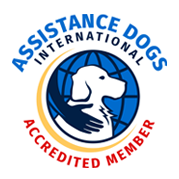Thank you for your interest in a mobility, hearing, or facility dog. Independence shouldn’t be limited to those who look or live a certain way. Disability reaches all ages, races, classes, and backgrounds and Duo Dogs will too. Currently, we use Labrador and Golden Retrievers because of their excellent disposition and willingness to perform the tasks necessary of a working dog. We do not train personal dogs to be Assistance Dogs.
Due to the specialized nature of Duo Dog’s training program we are limited in the type of Assistance Dogs we are able to place.
- Duo Dogs does not train Guide Dogs for individuals who are blind or visually impaired.
- Duo Dogs does not train Medical Alert service dogs and are unable to act as a Medical Alert dog. They are not trained to notify their human partners or caregivers of a migraine, seizure, diabetic emergency or any other kind of medical emergency.
- Duo Dogs does not train Balance Assistance Dogs. Duo dogs are not trained to provide balance support and are unable to tolerate body weight during standing, ambulation or stair climbing, to provide any type of bracing for fall prevention or transferring (in/out of a chair, getting up from a floor, etc.). To do so would injure the dog or endanger the client.
- Duo Dogs does not train Emotional Support Dogs or Psychiatric Assistance Dogs for clients diagnosed with primary mood disorder’s including but not limited to Anxiety, Depression, or Bi-polar Disorder. Duo dogs cannot be trained to provide personal protection. Duo does not train dogs for Autism Support or any mental health or trauma related diagnosis other than PTSD. At this time, the program is limited to placing PTSD Assistance Dogs with Veterans residing within 50 miles of the Duo Dogs facility. Since emotional support dogs are NOT covered under the Americans with Disabilities Act, we would recommend looking into an organization that provides Psychiatric Assistance Dogs.
Need another kind of Assistance Dog? Visit www.assistancedogsinternational.org for a list of accredited Assistance Dog organizations.
Eligibility Requirements
General Eligibility Requirements
The applicant(s) must be able to care for and cover the cost of the dog’s basic daily needs, veterinary needs and extended needs including exercise and enrichment. ALL applicants must have the cognitive ability and working memory necessary to coordinate care for the dog, learn and implement a complex sequence of commands paired with physical redirection. We require ALL applicants and those residing in their households aged 18+ to complete a background check. Applicants for Assistance Dogs must have received documentation of diagnosis of a disability/disabling condition at least ONE YEAR PRIOR to application. ALL applicants are required to attend Team Training and purchase the Assistance Dog Equipment Kit.
Mobility Assistance Dog
An applicant for a Mobility Dog must be at least 14 years of age. Applicants seeking a Mobility Dog must have a documented disability for at least the past one year that hinders their mobility. Applicants must not be an active fall risk and must be able to transfer and brace themselves independently with or without the use of an assistive mobility device. The applicant must have good balance with or without the use of an assistive mobility device. Functional upper body strength and adequate motor control that allows for the handling of an Assistance Dog is required (assistive devices may be incorporated to assist with this, as needed). Applicants must possess the cognitive ability to provide for an Assistance Dog’s safety and well-being. Mobility clients must be able to independently handle, care for, and verbally command an Assistance Dog.
“Family Placements” may be considered on a case-by-case basis in instances that a client, age 14 years or older, requires or receives some family assistance but personally possesses the capacity to independently command, handle, and care for an Assistance Dog. A client age 18 years and older must be able to independently handle and command an Assistance Dog in public at all times. Family Placements for clients between the ages of 14-17 years of age indicate that the guardian(s) of the minor client will retain and uphold the requirements of a “Family Street Certification”. A Family Street Certification requires that the adult guardian physically handle the Assistance Dog in public settings at all times alongside and in place of the minor client.
PTSD Assistance Dog (Veteran specific)
Duo’s Post Traumatic Stress Disorder Program serves Veterans residing within 50 miles of the Duo Dogs facility. Duo does not train PTSD Dogs for the mitigation of any other psychiatric diagnosis or symptoms or as a result of any other type of trauma. Veterans applying for a PTSD Dog must be connected to and receive the on-going support of a mental health provider at the Veterans Administration or another mental health provider. A diagnosis of PTSD must have been made by a mental health professional at least ONE YEAR PRIOR to application. PTSD Dogs can reorient a client to time and place, reduce anxiety, intervene during nightmares and night terrors, increase confidence in public spaces, and provide a social bridge for positive interactions in the community. Our PTSD dogs cannot alert you to sudden noises, provide traffic safety, search rooms, or provide guarding or personal security.
Hearing Assistance Dog
Applicant must be able to provide current Audiogram. Duo Dogs does not place Hearing Dogs with individuals under the age of 18. Hearing Dogs placed must be the exclusive dog in the home. Duo Dogs can only alert you to noises they are trained to identify, for example the phone, door bell, your name, smoke detector etc.; our dogs cannot alert you to sudden or transient noises, provide traffic safety, or provide personal security.
Facility Dog
ALL facility applicants must serve physically, psychologically or socially at-risk/vulnerable populations. The dog is used as an adjunct or complement to therapeutic interactions by licensed or certified workers that have been trained as handlers by Duo Dogs. Each facility must provide a minimum of 2 certified handlers that will complete training. Please note that Facility Dogs do not have public access and do not fall under the protection of the Americans with Disabilities Act.


